#African Continental Free Trade Area
Text
How the AfCFTA Aims to Create a Single Market for Goods and Services in Africa
The African Continental Free Trade Area (AfCFTA) is a historic agreement between 54 African countries that aims to create a single market for goods and services in Africa. The AfCFTA, which officially launched on January 1, 2021, is the largest free trade area in the world in terms of participating countries.
The AfCFTA seeks to boost trade within the African continent by removing tariffs and…
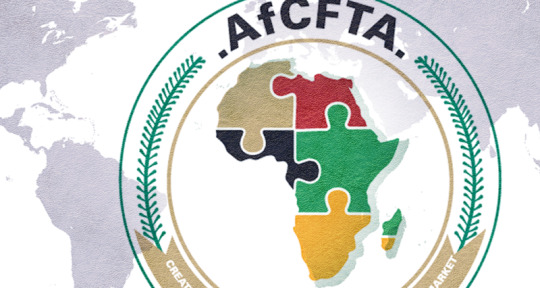
View On WordPress
10 notes
·
View notes
Text
ADVOCACY FOR FREE MOVEMENT FOR AFRICAN NATIONALS ON THE CONTINENT
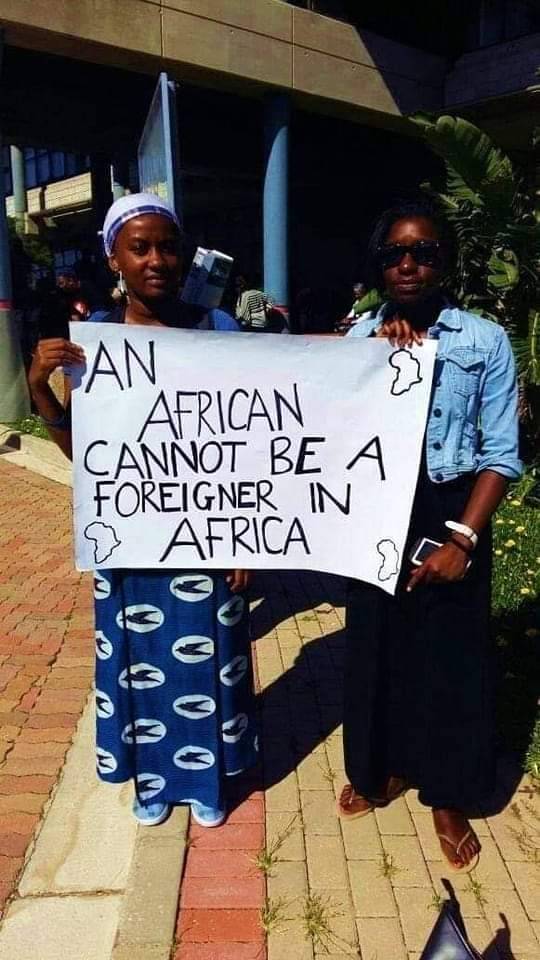
View On WordPress
#Addis Ababa#Africa Must Unite#African Continental Free Trade Area#African Union#Durban#Free movement#Lusaka#Organization of African Unity#Sirte
6 notes
·
View notes
Text
Pan-Africanism: Uniting The Continent For Progress And Prosperity
In recent years, Pan-Africanism has emerged as a powerful force, shaping the destiny of the African continent and fostering a sense of unity among its diverse nations. This dynamic ideology, rooted in a rich history, seeks to consolidate Africa’s strength and amplify its voice on the global stage.
Let’s delve into the fascinating journey of Pan-Africanism, exploring its history, goals,…
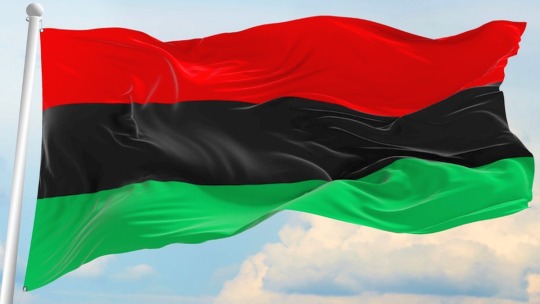
View On WordPress
#AfCFTA#Africa#African Continental Free Trade Area#African Countries#African Sovereignty#African Union#Africans#AU#Colonization#Imperialism#OAU#Organization of African Unity#Pan-African#Pan-Africanism
0 notes
Text
A Game-changer for Zimbabwean Female Entrepreneurs
African Continental Free Trade Area logo: Source – au-afcfta.org
The African Continental Free Trade Area (AfCFTA) is set to benefit SMEs and businesses owned by women entrepreneurs in Zimbabwe. The AfCFTA is an AU Agenda 2063 flagship initiative established to create an integrated continental market for goods and services and to support the movement of capital and natural persons. Article 3 of…

View On WordPress
#AFCFTA#African Continental Free Trade Area#Free Trade#SADC#SADC AFCFTA Environment InternationalTrade RECS#Zimbabwe Institute of African Integration
0 notes
Text
Take opportunity of AfCTA’s N3.4tn, FG tells banks
Take opportunity of AfCTA’s N3.4tn, FG tells banks
The Federal Government says the African Continental Free Trade Area has opened up opportunities for the Nigerian finance industry.
The government says the African free trade will create $3.4tn opportunity and deepen the financial technology space for the industry.
Speaking at the 15th Annual Banking and Finance Conference in Abuja on Tuesday, Nigeria’s President, Major General Muhammadu Buhari…

View On WordPress
0 notes
Text
SYDA President Calls On African Governments To Educate The Youth On The Benefits Of AfCFTA
SYDA President Calls On African Governments To Educate The Youth On The Benefits Of AfCFTA
The African Continental Free Trade Area (AfCFTA) is a game-changer in the African business setting, for that reason, adequately resourcing the youth mentally and educating them on its benefits is a crucial expectation.
“If our youths are enlightened about the benefits of the AfCFTA and its utilization, then ending unemployment within our continent would no longer be a mirage, but a reality”.
Mr…

View On WordPress
#AfCFTA#African Continental Free Trade Area#African governments#African Youth Entrepreneurship Summit#Mr Atta Akoto Senior#News#President of SYDA#Sunyani Youth Development Association#SYDA#YES-Africa#YES-Africa Summit
0 notes
Text
SMEs in Africa to access $50M support in UBA-African Guarantee Fund partnership
SMEs in Africa to access $50M support in UBA-African Guarantee Fund partnership #AfricaContinentalFreeTradeArea
Group Managing Director/CEO, United Bank for Africa(UBA), Mr. Oliver Alawuba and Group CEO, African Guarantee Fund, Mr Jules Ngankam; during signing of partnership between UBA and AGF where the latter will guarantee $50m of UBA’s new $100m Loans to SMEs operating across the 20 African countries, in Lagos (PHOTO/Courtesy).
LAGOS, Nigeria – The United Bank for Africa (UBA) and African Guarantee…
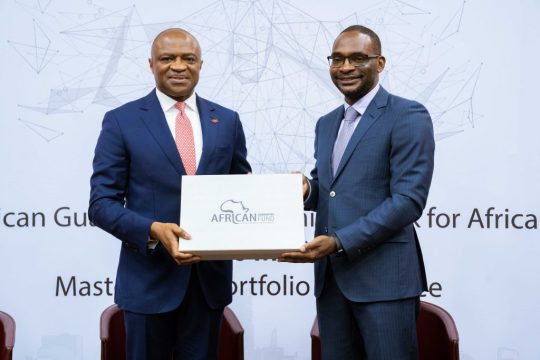
View On WordPress
0 notes
Text
Infrastructure Is Key To Unlocking Africa's Economic Potential
@ssulayem said #BEZ & #BerberaPort in #Somaliland are precisely the kind of investments that can start unlocking the economic possibilities for the #HornOfAfrica. According to @somalilandmfa, It could create more than 12K direct employment opportunities & over 50K indirect jobs
(more…) “”

View On WordPress
#Africa#African Continental Free Trade Area (AfCFTA)#Berbera Container Terminal#Berbera Corridor#Berbera Economic Zone (BEZ)#Berbera Free Zone (BFZ)#Berbera Port#Horn of Africa#Infrastructure#Port Of Berbera#Somaliland#Sultan Ahmed Bin Sulayem
0 notes
Text
Attain the African continent’s economic growth and development goals as articulated in Agenda 2063 and Agenda 2030.
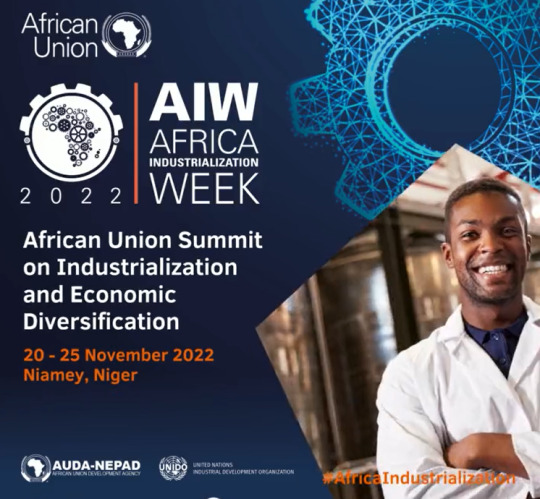
The African Union Summit on Industrialization and Economic Diversification aims to highlight Africa’s renewed determination and commitment to Industrialization as one of the central pillars in attaining the continent’s economic growth and development goals as articulated in Agenda 2063 and Agenda 2030. In light of the key and strategic interdependences between Industrialisation and the African Continental Free Trade Area Agreement (AfCFTA), the Summit aims to rally desired political momentum, resources, partnerships and alliances towards an Africa-Industrialisation drive. This is along the continent’s resolve to drive structural transformation, built around leveraging Africa’s rich and diverse natural resources while at the same time embracing current advances in technologies, continental and global geo socio-political trends and emergence of tradeable services.
The Summit is anticipated to unlock the evolution of a vibrant Pan-African enterprise and capital base that will unleash an inclusive and sustainable industrialisation pathway that carries along with the participation of all economic agents, including SMEs, youth, and women in the generation of national wealth and creation of jobs as well as expansion of entrepreneurship opportunities for Africa’s populations. The impacts of the novel coronavirus pandemic continue to drive the urgent and imperative need for bold actions to drive transformative change in key economic pillars such as Industrialisation.
The specific objectives of the African Union Industrialization and Economic Diversification Summit are:
Decide on a renewed continental policy framework on Africa’s industrialisation aimed at rallying the continent’s resolve and commitment to a bold set of policy and investment actions to accelerate the continent’s industrialisation drive
Reinforce the development of regional industrial value chains to clearly articulate Africa’s quest to industrialize, create jobs and entrepreneurship opportunities for Africa’s MSMEs, youth and women within the context of current and emerging continental and global socio-economic trends.
Provide high-level political support to drive a globally competitive Africa-Industrialisation programme through public-private alliances, at the national, regional, continental level, and aligned global policy coherence, coordination and linkages, investment financing. This should take full cognizance of current and emerging key cross-sector needs including energy and water, education and training, Science-Technology and Innovation, climate change, environmental resilience and crisis management.
#African Continental Free Trade Area Agreement (AfCFTA)#Africa’s MSMEs#quest to industrialize#entrepreneurship#Economic Diversification#summit#Industrialization#sustainable development#Agenda 2063#agenda 2030#economic growth
0 notes
Text
Come funziona il mercato unico africano?
https://aedic.eu/investire-in-africa/come-funziona-il-mercato-unico-africano/
Come funziona il mercato unico africano?
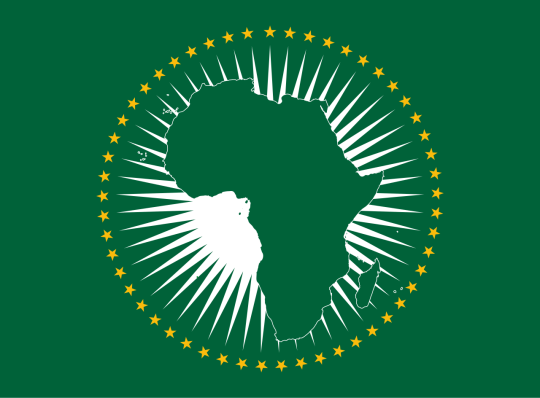
L’accordo sottoscritto ed entrato in vigore il 1 gennaio 2021 e che nei fatti fa partire AfCFTA ovvero Il Trattato di Libero Commercio Continentale Africano, (in inglese African Continental Free Trade Agreement, abbreviato AfCFTA è un trattato internazionale che regola l’apertura delle frontiere e la creazione di un’area di libero scambio tra i Paesi africani membri.
A luglio 2019 erano 54 i firmatari. L’unico stato africano a non aver né firmato né ratificato l’accordo è l’Eritrea.
Il trattato prevede di azzerare le tariffe doganali sul 90 per cento delle merci che attraversano i confini degli stati firmatari. Sono inclusi anche i servizi, il che è fondamentale visto che nel 2017 hanno rappresentato il 53 per cento del pil del continente, fa sapere l’Uneca, United nations economic commission for Africa. In questa fase transitoria, i dazi rimarranno attivi solo su un numero limitato di settori economici ritenuti particolarmente sensibili per gli interessi nazionali.
Considerato che un cambiamento così radicale non può avvenire dall’oggi al domani, è previsto un periodo cuscinetto di cinque anni, che potrà essere prorogato dalle economie più fragili. Come spiega l’Ispi (Istituto per gli studi di politica internazionale), questo è il primo step di:
“un percorso più lungo che prevede come stadi successivi, in un futuro non ancora prossimo, l’unione doganale e quella monetaria”.
L’idea di fondo, quella che anima l’area di libero scambio, è porre le basi perché i Paesi africani comincino a creare valore aggiunto, cioè a lavorare le materie prime di cui sono ricchi, a dotarsi per esempio di impianti di trasformazione dei prodotti agricoli.

E tutto questo porterà a una maggiore prosperità e creerà milioni di posti di lavoro. L’area di libero scambio ha la forza di innescare questo processo. Un processo lungo, che non si esaurirà in poco tempo e che dovrà essere accompagnato da infrastrutture e implementazione di quanto al momento è solo su carta.
La Commissione economica per l’Africa delle Nazioni Unite (UNECA) ha stimato che, entro il 2022, l’accordo farebbe aumentare il

commercio intra-africano del 52 per cento. Lo scorso 22 dicembre, ad Addis Abeba, ha preso la parola David Luke, coordinatore dell’African Trade Policy Center (ATPC) della Commissione economica per l’Africa (ECA).
“AfCFTA dovrebbe funzionare in quanto è l’unico percorso del continente verso lo sviluppo sostenibile. Non sottovalutiamo l’importanza di questa iniziativa. Non esiste un piano B”
– ha dichiarato David Luke durante un webinar.
Grazie a questo trattato si creeranno milioni di nuovi posti di lavoro in Africa
Così il commercio del continente africano apre a un mercato di 1,2 miliardi di persone che vale 2.500 miliardi di USD di PIL e che presto con gli investimenti da parte di investitori esteri potrebbe trasformarsi in e diventare 4.000.
L’obiettivo di questo immenso progetto appena iniziato è ambizioso: la creazione di milioni di nuovi posti di lavoro che andrebbero a beneficiare giovani e donne.
Ascolta l’interessante intervista al Professore Gianfranco Tusset, docente di Storia dell’Università di Padova sulle opportunità generate dall’apertura del mercato unico africano.
youtube
Gestire il cambiamento e la vostra espansione in Africa con calma e professionalità
Grazie agli importanti riconoscimenti e collaborazioni bilaterali con istituzioni, agenzie portuali etc., per la vostra svolta economica in Africa, AEDIC offre l’opportunità di entrare in un porto sicuro, con vantaggi fiscali e detassazione per 10 anni, concessioni e basso costo di mano d’opera specializzata altamente scolarizzata in posizione centrale in AFRICA.
Quando avete deciso di agire, vi forniamo tutti gli strumenti essenziali di gestione del rischio per tutto il ciclo di vita dell’investimento.

Aedic con i suoi consulenti vi dà l’opportunità di entrare in Africa Centrale e prendere posizione dove sta sorgendo la città industriale di Kribi.
Guardate questo video per comprendere meglio di cosa stiamo parlando.
youtube
Che cosa desiderate fare ora?
se desiderate entrare in contatto con noi per sviluppare la vostra opportunità di Business in Africa compilate il form che vedete quì sotto, un nostro consulente vi contatterà entro 24 ore
Il tuo nome
La tua email
Oggetto
Il tuo messaggio (facoltativo)
Consenso GDPR Privacy e Cookies (richiesto)
Do il mio consenso al trattamento dei miei dati per i fini relativi al loro trattamento e confermo che ho letto la normativa sulla privacy del sito.
0 notes
Text
Come funziona il mercato unico africano?
New Post has been published on https://aedic.eu/investire-in-africa/come-funziona-il-mercato-unico-africano/
Come funziona il mercato unico africano?
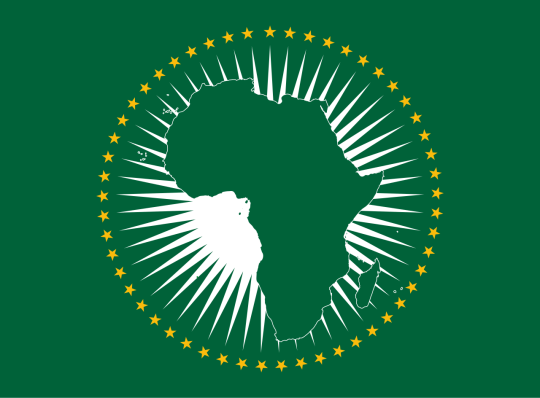
L’accordo sottoscritto ed entrato in vigore il 1 gennaio 2021 e che nei fatti fa partire AfCFTA ovvero Il Trattato di Libero Commercio Continentale Africano, (in inglese African Continental Free Trade Agreement, abbreviato AfCFTA è un trattato internazionale che regola l’apertura delle frontiere e la creazione di un’area di libero scambio tra i Paesi africani membri.
A luglio 2019 erano 54 i firmatari. L’unico stato africano a non aver né firmato né ratificato l’accordo è l’Eritrea.
Il trattato prevede di azzerare le tariffe doganali sul 90 per cento delle merci che attraversano i confini degli stati firmatari. Sono inclusi anche i servizi, il che è fondamentale visto che nel 2017 hanno rappresentato il 53 per cento del pil del continente, fa sapere l’Uneca, United nations economic commission for Africa. In questa fase transitoria, i dazi rimarranno attivi solo su un numero limitato di settori economici ritenuti particolarmente sensibili per gli interessi nazionali.
Considerato che un cambiamento così radicale non può avvenire dall’oggi al domani, è previsto un periodo cuscinetto di cinque anni, che potrà essere prorogato dalle economie più fragili. Come spiega l’Ispi (Istituto per gli studi di politica internazionale), questo è il primo step di:
“un percorso più lungo che prevede come stadi successivi, in un futuro non ancora prossimo, l’unione doganale e quella monetaria”.
L’idea di fondo, quella che anima l’area di libero scambio, è porre le basi perché i Paesi africani comincino a creare valore aggiunto, cioè a lavorare le materie prime di cui sono ricchi, a dotarsi per esempio di impianti di trasformazione dei prodotti agricoli.

E tutto questo porterà a una maggiore prosperità e creerà milioni di posti di lavoro. L’area di libero scambio ha la forza di innescare questo processo. Un processo lungo, che non si esaurirà in poco tempo e che dovrà essere accompagnato da infrastrutture e implementazione di quanto al momento è solo su carta.
La Commissione economica per l’Africa delle Nazioni Unite (UNECA) ha stimato che, entro il 2022, l’accordo farebbe aumentare il

commercio intra-africano del 52 per cento. Lo scorso 22 dicembre, ad Addis Abeba, ha preso la parola David Luke, coordinatore dell’African Trade Policy Center (ATPC) della Commissione economica per l’Africa (ECA).
“AfCFTA dovrebbe funzionare in quanto è l’unico percorso del continente verso lo sviluppo sostenibile. Non sottovalutiamo l’importanza di questa iniziativa. Non esiste un piano B”
– ha dichiarato David Luke durante un webinar.
Grazie a questo trattato si creeranno milioni di nuovi posti di lavoro in Africa
Così il commercio del continente africano apre a un mercato di 1,2 miliardi di persone che vale 2.500 miliardi di USD di PIL e che presto con gli investimenti da parte di investitori esteri potrebbe trasformarsi in e diventare 4.000.
L’obiettivo di questo immenso progetto appena iniziato è ambizioso: la creazione di milioni di nuovi posti di lavoro che andrebbero a beneficiare giovani e donne.
Ascolta l’interessante intervista al Professore Gianfranco Tusset, docente di Storia dell’Università di Padova sulle opportunità generate dall’apertura del mercato unico africano.
youtube
Gestire il cambiamento e la vostra espansione in Africa con calma e professionalità
Grazie agli importanti riconoscimenti e collaborazioni bilaterali con istituzioni, agenzie portuali etc., per la vostra svolta economica in Africa, AEDIC offre l’opportunità di entrare in un porto sicuro, con vantaggi fiscali e detassazione per 10 anni, concessioni e basso costo di mano d’opera specializzata altamente scolarizzata in posizione centrale in AFRICA.
Quando avete deciso di agire, vi forniamo tutti gli strumenti essenziali di gestione del rischio per tutto il ciclo di vita dell’investimento.

Aedic con i suoi consulenti vi dà l’opportunità di entrare in Africa Centrale e prendere posizione dove sta sorgendo la città industriale di Kribi.
Guardate questo video per comprendere meglio di cosa stiamo parlando.
youtube
Che cosa desiderate fare ora?
se desiderate entrare in contatto con noi per sviluppare la vostra opportunità di Business in Africa compilate il form che vedete quì sotto, un nostro consulente vi contatterà entro 24 ore
Il tuo nome
La tua email
Oggetto
Il tuo messaggio (facoltativo)
Consenso GDPR Privacy e Cookies (richiesto)
Do il mio consenso al trattamento dei miei dati per i fini relativi al loro trattamento e confermo che ho letto la normativa sulla privacy del sito.
0 notes
Text
PAPSS: A crucial payment system for the African market, By Lanre-Peter Elufisan
PAPSS: A crucial payment system for the African market, By Lanre-Peter Elufisan
The implementation of PAPSS will help Africa become a market open to the movement of goods and people, through improved financial transactions. As the continent forges ahead on the AfCFTA, a critical economic integration project, resolving payment and settlement bottlenecks will help African currencies retain value. Finally, PAPSS will also serve as a verifiable platform for supporting…

View On WordPress
#African Continental Free Trade Area (AfCFTA)#African Export-Import Bank (Afreximbank)#Lanre-Peter Elufisan#Pan-African Payment and Settlement System (PAPSS)#Society for Worldwide Interbank Financial Telecommunication (SWIFT) network#West African Monetary Zone (WAMZ)
0 notes
Text
Africa-China Relationship: Has Africa lost its sovereignty or has China lost its grip on the continent

View On WordPress
#Addis Ababa#Africa#African Continental Free Trade Area#African Union#Angola#Ethiopia#Kenya Republic of Congo Cameroon#Zambia#Zimbabwe
0 notes
Text
Africa Will Be A Power House of the New Multipolar World Order
Introduction
In this era of rapid globalization, the world is undergoing a marked shift from the hegemony of a few dominant powers to a more balanced and inclusive multipolar world order. Among the emerging players, Africa is poised to take center stage and flourish as a power house of this new era.
With its vast resources, untapped potential, and dynamic youth population, Africa is…
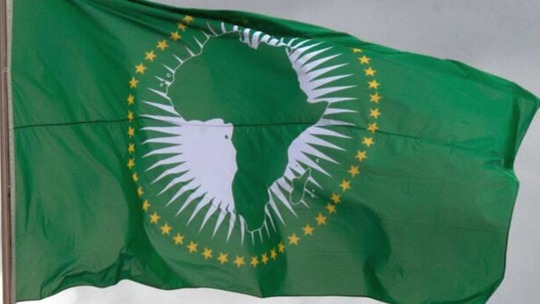
View On WordPress
#AfCFTA#Africa#Africa Multipolar World Order#African Continental Free Trade Area#African Union#AU#Multipolar World#Multipolar World Order#Pan-Africanism
1 note
·
View note
Text
"Visit Africa: Navigating the African Continental Free Trade Area for Boosting Intra-African Tourism"
By Julien Reteno
In recent years, the African continent has taken a significant leap forward in the quest for economic integration with the African Continental Free Trade Area (AfCFTA). This ambitious trade agreement, brokered by the African Union, aims to create a single market for goods and services, thereby facilitating the free movement of people and investments across the continent. The AfCFTA holds the potential to revolutionize African economies, encouraging the diversification of income sources, increasing trade volumes, and fostering innovation.
The importance of economic integration in Africa cannot be overstated. It encourages economies of scale, reduces trade barriers, and fosters a more competitive business environment. By promoting intra-African trade, the AfCFTA can help to reduce the continent's reliance on external markets, thereby strengthening its resilience against global economic shocks.
The Potential of Intra-African Tourism
Despite the diverse attractions and rich cultural heritage that Africa offers, the tourism industry on the continent has traditionally focused on attracting international tourists. Yet, as Africa's economies develop and incomes rise, there is growing recognition of the potential for intra-African tourism. African tourists visiting other African countries can contribute to economic growth, foster cultural exchange, and promote unity among African nations.
President Cyril Ramaphosa of South Africa has noted, "This is a sector of our economy that can grow exponentially, and I believe we have not reached its full potential. We tend to think of tourism as associated with pleasure motives all the time. But it can also embrace business tourism, education tourism, health tourism and religion. Tourism is the new gold mine."
The AfCFTA, by promoting the free movement of people, can significantly boost intra-African tourism. By making it easier and more affordable for Africans to travel within the continent, the AfCFTA can help to unlock the full potential of Africa's tourism industry.
Visit Africa: A Catalyst for Change
In the burgeoning landscape of African tourism, one platform stands out for its innovative approach and commitment to promoting intra-African tourism - Visit Africa. This comprehensive platform aims to make booking trips across the continent a seamless experience, thereby encouraging more Africans to explore the beauty and diversity of their own continent.
Visit Africa stands at the intersection of technology and tourism. It leverages digital tools to
provide a user-friendly interface, comprehensive information, and secure booking options. By removing the hassle from planning and booking trips, Visit Africa makes it easier for Africans to explore their own continent.
Furthermore, Visit Africa is perfectly positioned to leverage the opportunities provided by the AfCFTA. By promoting the free movement of people and services, the AfCFTA can facilitate the growth of platforms like Visit Africa, which are built on the premise of intra-African tourism.
Going Beyond the Beaten Track
Visit Africa distinguishes itself by going beyond the well-trodden tourist paths. It works closely with tourism authorities across the continent to highlight lesser-known destinations, thereby helping to develop new tourism markets. This approach fosters a more balanced and sustainable development of the tourism industry, promoting local economic development and job creation in regions that have been overlooked in the past.
For instance, Visit Africa has been instrumental in promoting tourism in destinations like the serene Lake Malawi, the ancient rock-hewn churches of Lalibela in Ethiopia, and the lush landscapes of the Rwenzori Mountains in Uganda. By shedding light on these hidden gems, Visit Africa not only offers travelers a unique and authentic experience but also contributes to the socio-economic development of these regions.
Fostering Collaboration and Knowledge Sharing
One of the key strategies of Visit Africa is to facilitate collaboration and knowledge sharing among tour operators. This initiative bridges the gap between operators in more developed markets and those in emerging destinations, thereby helping to disseminate best practices and innovative ideas.
For example, a tour operator in Tanzania, a country with a well-developed safari tourism industry, can share insights on sustainable tourism practices, effective marketing strategies, and customer service excellence with a counterpart in a less developed market like Togo. This exchange of knowledge and expertise can help the latter to enhance its service offering, attract more tourists, and contribute to the growth and development of the tourism industry in Togo.
Cross-Border Tourism in the AfCFTA Era.
The advent of the AfCFTA heralds a new era for cross-border tourism. The agreement, by promoting free movement of people and services, opens up new opportunities for cross-border tour itineraries, campaigns, and offers. Visit Africa, in line with this new reality, is working tirelessly to facilitate such cross-border initiatives. For instance, Visit Africa is exploring opportunities to create itineraries that span multiple countries, allowing tourists to experience the diverse cultures, landscapes, and wildlife of Africa. Imagine a tour that starts in the historic city of Marrakech in Morocco, takes you through the vibrant markets of Lagos in Nigeria, leads you to the stunning Victoria Falls in Zambia and Zimbabwe, and ends with a relaxing beach holiday in the Seychelles. Such cross-border tours can provide a unique experience for tourists and promote regional integration.
Connecting the Diaspora
The African diaspora plays a crucial role in boosting tourism on the continent. The deep emotional and cultural ties that members of the diaspora maintain with their home countries make them keen tourists and ambassadors of African destinations. Visit Africa and the AfCFTA both recognize this potential and are working towards facilitating diaspora tourism.
Visit Africa's platform is designed to cater not only to residents of the continent but also to the African diaspora. It provides comprehensive information on destinations, offers convenient booking options, and promotes unique experiences that resonate with the diaspora's desire to connect with their roots.
Moreover, the AfCFTA, by promoting the free movement of people and reducing barriers to travel, can facilitate the return of the diaspora to the continent, whether for tourism, business, or permanent return. This influx of diaspora tourists can contribute significantly to the growth of the tourism industry.
Challenges and Opportunities
Despite its immense potential, intra-African tourism faces several challenges. These include the lack of infrastructure, visa restrictions, high cost of travel, and limited awareness of Africa's diverse tourist attractions. However, with the implementation of the AfCFTA and the innovative efforts of platforms like Visit Africa, these challenges can be turned into opportunities.
For instance, the AfCFTA can stimulate investment in tourism infrastructure by creating a more attractive business environment. It can also facilitate the relaxation of visa restrictions and reduce the cost of travel by promoting competition and efficiency in the aviation industry. Meanwhile, Visit Africa, through its digital platform, can raise awareness of Africa's diverse attractions and make it easier for visitors to plan and book their trips.
Looking Forward
As we gaze into the future of the African economy, it becomes increasingly clear that the African Continental Free Trade Area will play a transformative role. Platforms like Visit Africa are poised to ride this wave of change and leverage the opportunities it offers to turbocharge intra-African tourism. By shining a light on lesser-known destinations, fostering collaboration among tour operators, facilitating cross-border tours, and connecting the diaspora, Visit Africa is an instrumental player in unlocking the potential of the AfCFTA and redefining the contours of African tourism.
As eloquently articulated by President Ramaphosa, "Africa is pristine. It has beautiful wide beaches, and some of the oldest and diverse flora and fauna. We have majestic scenery from the ancient Sahara Desert to the savannah grasslands of the Maasai Mara and the southern point where the Indian and Atlantic oceans meet. I am proud to say as Africans that we have world-class national parks at the forefront of conservation of rare and endangered species."
The horizon is aglow with possibilities for intra-African tourism, and platforms like Visit Africa are forging a path towards a more integrated, inclusive, and sustainable tourism industry that truly cherishes and showcases the beauty and diversity of the African continent.
Julien Reteno is the passionate author and CEO of PANEOTECH, the company behind the groundbreaking Visit Africa platform. With a deep-rooted love for Africa and a vision to promote intra-African tourism, Julien has dedicated his career to unlocking the continent's vast potential in various industries. As a seasoned traveler and entrepreneur, Julien understands the transformative power of tourism in fostering economic growth and cultural exchange. Through Visit Africa, Julien envisions a seamless and immersive experience for African travelers, connecting them with diverse destinations and showcasing the beauty and richness of their own continent. With his leadership and unwavering commitment, Julien strives to make Visit Africa the go-to platform for exploring Africa's hidden treasures. Through his writings and initiatives, Julien aims to inspire Africans and the global community to embark on their own extraordinary journeys of (re)discovery within Africa.
2 notes
·
View notes
Text
Botswana and Comoros latest countries to ratify the AfCTA agreement
In a show of growing support for the AfCFTA, the two countries ratified the agreement during the 36th Ordinary Session of the AU, bringing the tally of member state ratifications to 46.
Bonface Orucho, bird story agency
The African Continental Free Trade Area (AfCFTA), which aims to create a single market for goods and services in Africa, got another boost after two more countries handed over…

View On WordPress
5 notes
·
View notes